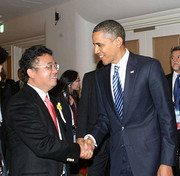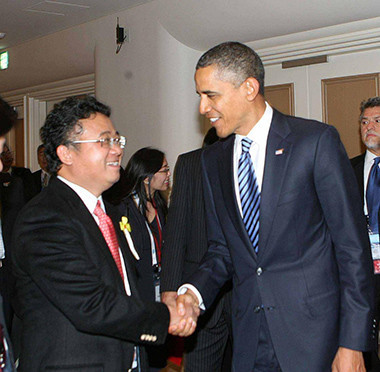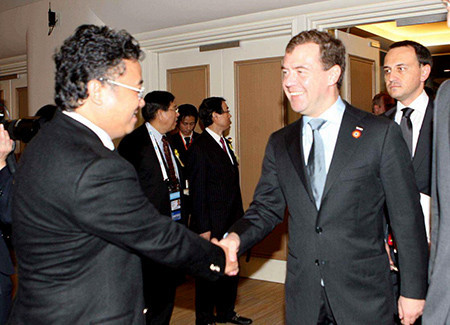Mr. Dang Thanh Tam, Chairman of Saigon Invest Group: Exchange rate is the biggest barrier

Mr. Dang Thanh Tam exchanged with the APEC’s leaders and greeted the US President Obama on November 13 2010.
If the State Bank doesn’t lift the current exchange rate limitations, Vietnam’s businesses will continue to experience many difficulties. In macro view, foreign investments will be constrained in the time to come ". Mr. Dang Thanh Tam, Chairman of Saigon Invest Group and Member of the APEC Business Advisory Council – observed in an interview with the Labor Newspaper’s reporter right after he came back to Vietnam from the Asia-Pacific Economic Forum held in Japan.
Vietnam’s Stock Market Index doesn't genuinely reflect Vietnam economy
One of the major issues being under discussion at the APEC forum was to ensure sustainable and equal development amongst APEC members. The fact that many countries devalue their currencies is triggering a "currency war". What is your opinion on this issue, how do countries evaluate the value of Vietnamese dong (VND) on the international market?
The trade of APEC countries account for 60% of global trade, the APEC's GDP represents 55% of total global GDP. This is an opportunity for Vietnam to promote trade activities with 21 country members. An important message that I would want to deliver to Vietnam’s businesses for doing business with the APEC countries is that the countries are committed to working together to ensure the currency stability, to avoid a currency devaluation war.
Beforehand, as a consequence of the global economic recession, many countries have devalued their currencies to gain more competitive trade advantages. This results in inequality in trade amongst countries. In order to achieve sustainable development, most of the countries agree to orient themselves forward to a free market by establishing a free trade area in the APEC area, namely the Free Trade Area of the Asia Pacific (FTAAP). In order to achieve it, each group of countries will establish its own free trade area. For example, a free trade area namely P4 consists of four countries: Singapore, Vietnam, Chile and Peru and the P9 is under negotiation to admit Vietnam, the United States, Malaysia, New Zealand, Australia. If admitted, Vietnam will not have to negotiate the Vietnam-US Bilateral Agreement and Vietnam – P9 Members Agreement. It is extremely advantageous for Vietnam to open the door to large economies.
Vietnam dong (VND), as assessed by many countries, still has been evaluated higher than expected. On the international markets, Vietnam's currency needs to be revaluated to its real value and have its stability assured to better promote trade activities and attract more direct and indirect foreign investments into Vietnam.
China remains the leading trading partner of many countries, including Vietnam. China
continues to keep its currency, the Yuan, artificially low, how has this issued resolved at the forum?
China has endured many criticisms on this issue. Nevertheless, China is determined not to raise the Yuan’s value since it affirms that the exchange rate is reasonable. In monetary aspect, the leaders of the APEC countries have pledged not to let the currency war happen and not to encourage the currency devaluation and to work closely together in the valuation of currencies in the coming time which will also benefit Vietnam’s trade and investment.
In this correlation, Vietnam dong’s value should be further lowered to stimulate the export growth. Vietnam dong is still valued higher than other currencies. Vietnam’s export businesses also suffer a disadvantage that Vietnam’s international payments are made in the United States dollar, not the Yuan. Vietnam dong is only used in the indirect transactions in USD, through the Yuan, although two-way trade between Vietnam and China has increased significantly in recent years.
Experts suggest that Vietnam may take into consideration signing a Vietnam-China currency swap agreement in order that the payments for the import and export between the two countries will not required to be made in USD. Nevertheless, this will have consequences since our import from China is greater than the export. Only if there is a solution to the import-export balance will the signing of currency swap, without going through USD transaction, have an effective impact on the import-export.
Number of countries have already signed bilateral currency swap agreement with China and been beneficent for not depending on the USD value between large trade partners.
In reality, China undoubtedly desires to sign with trade partners not to make payments through the USD. China’s partners such as Brazil, Argentina make payments in their own currencies, not in USD. If Vietnam reaches such an agreement with China, Vietnam would reduce the exchange rate risks whilst USD has abnormally fluctuated recently. This exchange rate barrier is causing big difficulties and losses for Vietnam’s export businesses. Nevertheless, it would be much meaningful only if Vietnam maintains an export-import balance with China.
|
Mr. Dang Thanh Tam exchanged with the government heads of the APEC countries and met the Russian President Medvedev on November 13 |
How has the APEC business community assessed the business and investment environment in Vietnam at the forum? What are the opportunities for Vietnam to attract investments in the coming time, Sir?
Investors still view Asia as an attractive investment destination to attract investment capitals. Nonetheless, in Vietnam, foreign investors remain concerned about the exchange rate since they have to convert their capital amount into Vietnam dong upon making their investments in Vietnam. For instance, over the past 12 months, Vietnam dong has lost 10% of its value. At the end of each business cycle, when calculating their profits, investors have to buy back foreign currency, as a result, they will suffer the exchange rate losses. For instance, an American investor borrows capital at the annual interest rate of 2% in the United States. One U.S. dollar is exchanged at VND 20,000, but in order to buy back one U.S. dollar, it will cost between VND 22,000 and 24,000 on average. As I said above, this would be also an exchange rate problem viewed from another angle. We need to re-determine the exchange rate in a reasonable and stable basis. Only such solutions could further encourage direct and indirect investments into Vietnam.
In relation to the domestic monetary policy, how do you evaluate the "crisis of confidence" on the Vietnam stock exchange?
The Dow Jones Industrial Average was over 10,000 points last year while the Vietnam Index was about more than 600 points. This year, the Down Jones is over 11,000 points while the Vietnam index is only approximate 400 points. This proves that the Vietnam stock index doesn’t truly reflect Vietnam's real economy (the GDP grew 5.25% last year and approximately 6.7% this year).
The decline was directly impacted by the monetary policy: Regulating and tightening the monetary policy due to the concern that the inflation would soar back. As a consequence, it will result in a very high interest rate, which will cause difficulties to businesses in the sales and production activities. Furthermore, the constantly changing monetary policies are affecting the psychology of investors in Vietnam. It is contrary to the common increase and a relatively small decline of the global stock and I firmly believe that VN Index will again rise up. Undoubtedly, it also depends on the basic nature of the economy and the sustainable recovery. Once strong consumer index rebounds, it will stimulate the production and then the economic development. Accordingly, the confidence of consumers and investors will bounce back.
I want to highlight that the crisis does not mean the termination of all things. Crisis always comes with a lot of opportunities. The main problem here is how to restore confidence, will, and to firmly take the selected path on the basis of careful preparation and analysis.
As the president of one of the largest private economic groups in Vietnam, how do you forecast about Vietnam’s economy in the coming time?
The global economic situation has specifically appraised through the APEC forum. In 2010, the APEC countries have almost come out of the crisis, especially a very strong growth in Asia. Nevertheless, according to the APEC’s forecast, the APEC ‘s 2011 economy will reduce by 20% compared to the 2010. Therefore, some countries have adopted the demand stimulus policies, such as the United States using US$ 600 billion stimulus package, Japan using $ 100 billion ... to keep the economy out of the second downturn.
In 2011 Vietnam will still have many favorable development conditions thanks to the stable political system; the investment climate still shows its competitiveness ability with other countries in the region, low labor cost; its domestic inflation is controllable... The most critical issue is to create jobs through the foreign investments and exports. The promotion of foreign investment attraction and exports will help stabilize the macroeconomy. The environmental resources tax policy will generate a huge revenue if it is reasonably adjusted. And the most important, in my opinion, is the necessity of stable monetary policies to boost investors’ confidence. In 2011, Vietnam's economy will exceed 5.3% growth rate of 2009, nevertheless, whether it is higher than the 2010 growth rate or not remains unpredicted and it will depend greatly on the world situation and the macro policy of Vietnam. Nevertheless, with the spirit of the 11th Party Congress will surely be a huge driving force for economic growth, and as an inspiration to make Vietnam Index return to its value and truly reflecting the Vietnam economy.
Published news
- Establishment of Tan Tao University
- Credit agreement signing for Dakmi 2 hydro power plant
- The People's Military Newspaper writes about Tan Tao University
- Mdm. Dang Thi Hoang Yen – Co-Chair of ASEAN-BIS 2010 and Chairwoman & CEO of Tan Tao Group, attended the banquet hosted by the Vietnamese Prime Minister Nguyen Tan Dung at the ASEAN Leaders Summit 2010 in Hanoi
- Address by H.E. Mr. Nguyen Tan Dung Prime Minister of the Socialist Republic of Vietnam at the Opening Session ASEAN Business and Investment Summit 2010
- Chairwoman Dang Thi Hoang Yen Closing Speech at ASEAN Business Investment Summit (ASEAN-BIS 2010), October 28th 2010
- Message by Co-Chairwoman of ASEAN Business & Investment Summit, Chairwoman & CEO of Tan Tao Group – Vietnam, Ms. Dang Thi Hoang Yen
- Woman standing in front of the sea
- Building thermal power plant like a park
- To soon commence Kien Luong Thermal Power Project: Speed up GGU and PPA

